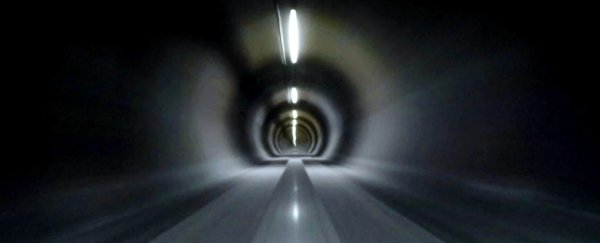Ever since Elon Musk shared his blueprints for the hyperloop - a revolutionary transport system that has the potential to shuttle humans at speeds of more than 1,200 km/h (746 mph) - the engineering community has been in overdrive, with hyperloop prototypes popping up all over the place.
And now Musk has put up footage of a test pod accelerating to 324 km/h (201 mph) over the space of just a few seconds, and… well, we'll let you watch for yourself, because it's pretty spectacular stuff.
The footage was shot at the SpaceX Hyperloop Pod competition over the weekend, and this is the winning design in action:
The competition was held at SpaceX's headquarters in Hawthorne, California, and this design - known as the WARR Hyperloop - was created by a team of 30 students from The Technical University of Munich in Germany.
The WARR Hyperloop pod is powered by a 50 kW electric motor, is made from carbon fibre, and weighs just 80 kg (176 pounds).
It beat out rival teams to achieve the fastest speed on the day - and Musk believes the test tube they were competing in could allow hyperloop pods to smash the speed of sound in future.
Congratulations to WARR team from Tech Univ Munich for winning 2nd @Hyperloop competition! Peak speed of 324 km/h, which is over 200 mph!!
— Elon Musk (@elonmusk) August 28, 2017
Might be possible to go supersonic in our test Hyperloop tube, even though it's only 0.8 miles long. Very high accel/decel needed …
— Elon Musk (@elonmusk) August 28, 2017
Impressive, right? Here's the footage of the full run:
Musk has since clarified that an actual, passenger-carrying hyperloop won't have that slightly dystopian strobe effect going on - that's just for testing.
And the acceleration also wouldn't be so dramatic in a passenger version - this test tube is only 1.2 km (0.75 miles) long, and so the acceleration had to happen incredibly fast.
In larger designs, the acceleration would be spread out comfortably, so passengers wouldn't even feel it while sipping a glass of wine in their sleek cabins.
To be clear, a Hyperloop passenger version wouldn't have intense light strobe effect (just for testing), nor uncomfortable acceleration
— Elon Musk (@elonmusk) August 28, 2017
Btw, high accel only needed because tube is short. For passenger transport, this can be spread over 20+ miles, so no spilt drinks.
— Elon Musk (@elonmusk) August 28, 2017
The hyperloop system works by using magnets to shuttle a levitating pod through a tube that contains a partial vacuum - allowing pods to accelerate without friction to speeds that would be impossible with air resistance. It was inspired by pneumatic mail tubes used more than 100 years ago.
According to calculations, a fully-functioning hyperloop could reach speeds of more than 1,200 km/h (746 mph), which would rival commercial airplanes.
Prototype hyperloop set-ups have already been built in Nevada and California, and full-scale models are proposed to connect New York City and Washington DC, Dubai and Abu Dhabi, as well as Paris and Amsterdam, in the coming years.
There's even talk of taking hyperloop technology underwater, which would mean that cross-continental travel could be possible.
If this is the future of travel, we're all in.
